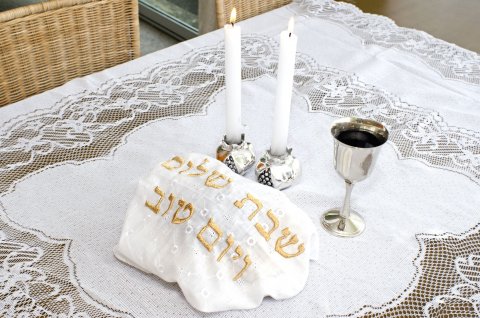Educator Spotlight: Helping Families Take Shabbat Home with Michael Witman


Michael Witman is the Director of Family Life and Learning at B’nai Jeshurun. He previously served as the Director of Education at Temple Beth-El of Great Neck for the past six years. Michael is a graduate of the Maurice Greenberg Center for Judaic Studies at the University of Hartford. He was a recipient of The Jewish Education Project Young Pioneers Award in 2012.
Tell us about your own Jewish education/upbringing.
I grew up in Stony Brook, NY. My father was the principal of a Reform congregation, but we belonged to a Conservative congregation. I actually hated my Hebrew School experience; I was the kid who got kicked out every day. That negative experience was a major motivation for the work I’m doing now, as were a number of positive experiences for me, like USY and Camp Eisner. Another motivation was my parents’ commitment that, no matter where we were in our religious practice, our family sat down to Shabbat dinner every Friday night at six o’clock. My Shabbat taught me that one of the major tools for cultivating lifelong Jewish learners is giving families the tools they need to have Shabbat in their own home.
How did you end up becoming a congregational learning professional?
I attended a music conservatory program, but felt it was about competition rather than learning, so I transferred to Judaic Studies. When I graduated, I was lucky to join the team at Central Synagogue developing cutting edge religious school curricula.
How have you used education as a tool to strengthen relationships in your local community?
Creating change in congregations is really important but also really difficult. Forming relationships in the congregation is always the starting point before implementing any change. At Temple Beth-El of Great Neck, we surveyed families about the change they wanted. One challenge was that families weren’t coming to Friday night services, so I started FACEtime (Family and Children Engagement time) where families would come to the synagogue for learning and services, followed by dinner at the Rabbi’s home. New relationships formed and as the program grew, we broke down the silo between the congregation’s “regulars” and the new FACEtime families.
Another challenge was the diminishing attendance during the last weeks of Hebrew school. Together with parents, we modeled the final weeks after the Jewish camping experience. We taught Hebrew through basketball, robotics with a Jewish spin, and held Maccabiah games. CampTBE, developed in conjunction with URJ camps, had 90% attendance. Kids were excited to attend and we also encouraged enrollment in Jewish camping.
Creating change in congregations is really important but also really difficult. Forming relationships in the congregation is always the starting point before implementing any change.
I heard you have your own drumming company and have facilitated Jewish learning through drumming. How does that work?
Shul of Rock formed years ago. In terms of spirituality and prayer, not everyone wants to sing. Rhythm can provide a way to connect, just as when voices come together we have the ability to connect to higher power. I’ve worked with many congregations, creating drum circles based on listening skills, connecting to the Shema and to each other through drumming. You can see the smiles on students’ faces from having that connection between rhythms.
You’ve been an active participant in several of The Jewish Education Project’s initiatives. How have those initiatives supported your work?
What really helped spark my career was receiving The Jewish Education Project’s Young Pioneers Award for my congregational work. I learned how change models impact congregational life by working with Mike Mellon and Suri Jacknis. I also enjoyed being a part of Lomed while I was working at Temple Beth Sholom of Roslyn, and countless professional development sessions over the years. You name it, I took part in it!
What’s the most rewarding experience you’ve had working in Jewish Education?
In this field, there are so many failures along the way - low numbers, losing families, losing a teachable moment, a parent upset - and we work so hard, so it’s easy to feel defeated. I learned that it’s vital to celebrate the successes. One colleague recommended putting the successes, the impact you’ve had on families, in a file and looking through it on challenging days. I didn’t realize the impact I had working at Temple Beth-El of Great Neck until I said good-bye and they presented me with a photo book. Being able to hear and see others’ stories of how I’ve impacted their lives… it was an unbelievable, out of body experience. I was so humbled, I couldn’t even speak. That is my highlight!
What are you looking forward to working on in your new role at B’nai Jeshurun this year?
BJ just completed a strategic planning process and implemented the new Family Life and Learning department: Jewish learning from “cradle to college.” The gist of it is that, for BJ to meaningfully support the unfolding of Jewish family life in the 21st century, we acknowledge the multiple identities and diverse configurations of today’s families; foster a strong sense of community for our families; create opportunities for families and children to learn how and why to make Judaism an essential part of their lives; and offer a variety of key touch points for families throughout their children’s lives.
In terms of programming, how does BJ plan to create those 'touch points'?
We’re thinking strategically about how to pair informal learning with important content. We’ve woven the history of the State of Israel into Krav Maga, prayer into yoga, and Jewish identity into photography.
Special programs like biblical improv and youth/teen services bridge the gap between day school and Hebrew school children. Havdalah and a movie – we recently enjoyed The Jazz Singer – engages parents and students in genuine dialogue. We’re also implementing a young families retreat to connect them to one another and to the congregation.
The Family Life and Learning department sees a significant retention rate for engaged teens. BJ offers trips to New Orleans in 8th/9th grades, and international service trips for older kids. The Teen Leadership Council enables teens to meaningfully experience the working of the synagogue. Teens can help in the Hebrew school, and also have opportunities to read on Shabbat and on holidays.
Yonah Kirschner is Project Manager, Digital Content and Communications at The Jewish Education Project.
